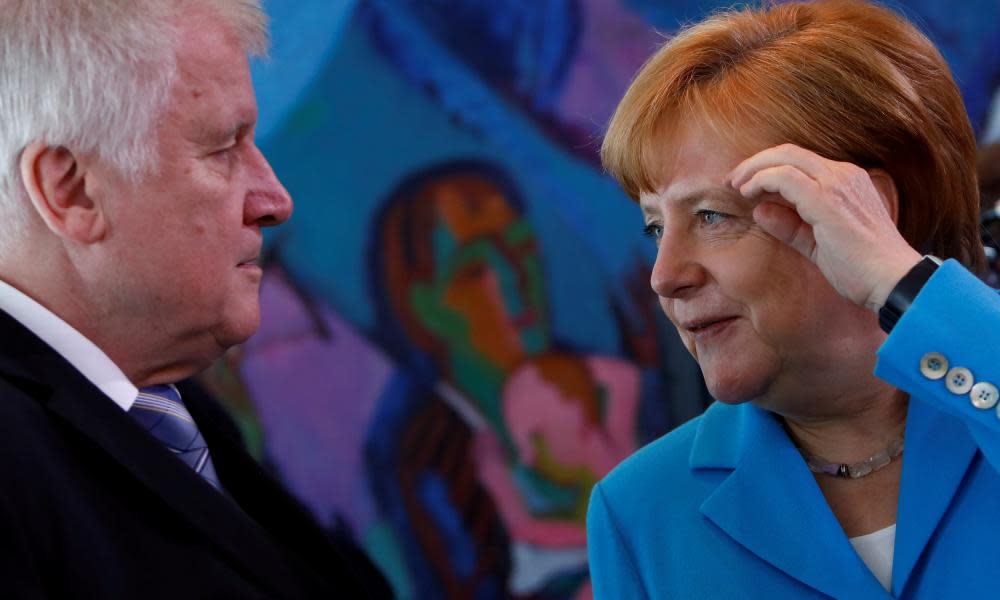Merkel gets extra time to reach deal with EU over asylum row

Germany’s interior minister, Horst Seehofer, has signalled he is open to giving Angela Merkel more time to reach a deal with Germany’s EU partners over an asylum row that has threatened to bring down her government.
As the German chancellor met leaders of her Christian Democratic Union (CDU) on Sunday in an attempt to divert the collapse of her fledgling administration, Seehofer emerged from emergency talks with his Christian Social Union (CSU) saying he had no intention of toppling Merkel.
Seehofer wants police stationed at borders to turn back refugees and migrants arriving from other EU countries but signalled he would give Merkel two weeks’ grace to reach migration agreements with EU partners.
“No one in the CSU is interested in bringing the chancellor down, or dissolving the CDU/CSU parliamentary partnership or destroying the coalition,” Seehofer told the Bild am Sonntag newspaper, adding that he did not want the asylum row to endanger the coalition government, which is less than 100 days old.
Seehofer said his party was keen to find a way to limit the number of asylum seekers arriving in Germany. “We finally want to have a solution for the return of refugees at our borders which is fit for the future,” he added.
But he was quoted in the Welt am Sonntag as having voiced his scepticism about the future of the CDU/CSU alliance in a meeting of the CSU’s leadership. “I cannot work with this woman any more,” he was quoted as saying.
At the centre of the showdown between Merkel and Seehofer, who are bitter rivals after the chancellor’s decision to allow almost a million refugees into Germany three summers ago, is disagreement over whether to allow those who have already registered in another EU country entry to Germany. Seehofer has said these migrants should be turned away at the German border whereas Merkel has said this can only happen with the agreement of the relevant EU states.
Merkel is only too aware of the fragility of European unity, which has been sorely tested over the refugee crisis. She fears a situation in which people are sent from country to country, with countries like Greece and Italy continuing to bear the brunt of the crisis.
Merkel was reportedly planning to contact all her EU counterparts over the next few days in the hope of striking a series of bilateral deals, ahead of a crucial EU summit at the end of June at which she hopes to come to an agreement to end the impasse. A spokesman for Merkel denied reports that she was planning to host a special crisis summit before the talks. Such a move could only happen if it was organised by the European commission, he said.
The CSU appeared to be at pains at the weekend to limit the damage done to the conservative alliance amid growing evidence the German government could be about to collapse.
The CSU faces a crucial state election in its home of Bavaria in October, and its hardline stance has widely been interpreted as an electioneering tactic as it attempts to claw back voters lost to the anti-immigrant Alternative für Deutschland party.
Joachim Herrmann, Bavaria’s interior minister, insisted the CSU was not intending to destabilise the CDU. “We’re not looking for a fight within the union,” he told the Frankfurter Allgemeine. “But the expectation of the citizens towards the interior minister is that he should act.” He added his party was not seeking to dissolve its decades-long alliance with the CDU despite widespread reports to the contrary.
Seehofer has earned the wrath of politicians across the political spectrum for appearing to seek a major confrontation with Merkel, threatening to place police at the border even if she rejected his plan, which would leave her little choice but to sack him. But doing so would bring down her government and her own political career would almost certainly be over.
Amid widespread calls for Merkel to sack Seehofer anyway, particularly if she wanted to retain her credibility, Jan Korte of the far-left Die Linke party said: “This Rambo in lederhosen needs to be stopped.”

 Yahoo News
Yahoo News 
